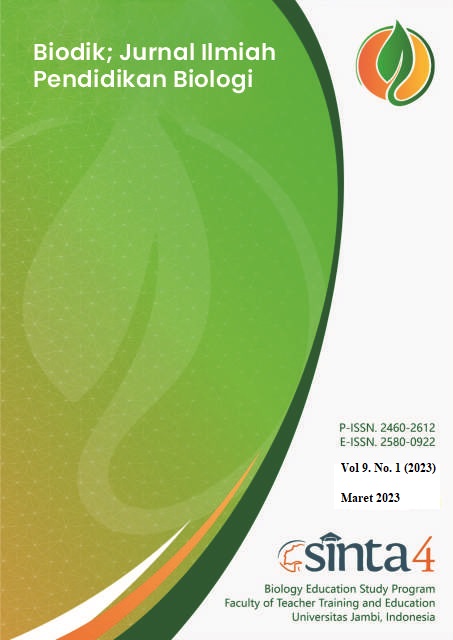Uji Keefektifan Lembar Kerja Peserta Didik Berorientasi Higher Order Thinking Skills Pada Materi Evolusi Kelas XII di SMA Negeri 4 Wajo
(Effectivity Testing of Higher Order Thinking Skills-Oriented Student Worksheet on Evolution Subject For Grade 12nd at SMAN 4 Wajo)
DOI:
https://doi.org/10.22437/bio.v9i1.18678Abstract
The purpose of this study is to find out the effectiveness of hots-oriented Student Worksheets (LKPD) that have been developed. This research is development research with reference to the ADDIE development model. This research was carried out at SMA Negeri 4 Wajo with a research sample, namely 30 students of class XII MIPA Collaboration. Based on the results of the study, it can be stated that the HOTS-oriented LKPD developed is effective, it can be seen from the number of students who achieved the KKM value of 25 people with a percentage classically of 83.33% so that it was declared effective.
Key words: effective, LKPD, HOTS, Evolution
Â
ABSTRAK
Tujuan dari penelitian ini adalah untuk mengetahui keefektifan Lembar Kerja Peserta Didik (LKPD) berorientasi HOTS yang telah dikembangkan. Penelitian ini merupakan penelitian pengembangan dengan mengacu pada model pengembangan ADDIE. Penelitian ini dilaksanakan di SMA Negeri 4 Wajo dengan sampel penelitian yaitu peserta didik kelas XII MIPA Kolaborasi sebanyak 30 orang. Berdasarkan hasil penelitian maka dapat dinyatakan bahwa LKPD berorientasi HOTS yang dikembangkan bersifat efektif, hal tersebut dapat dilihat dari jumlah peserta didik yang mencapai nilai KKM sebanyak 25 orang dengan persentase secara klasikal sebesar 83,33% sehingga dinyatakan efektif.Â
Kata kunci: efektif, LKPD, HOTS, Evolusi
Downloads
References
Adnan, & Arsad B. 2018. Beyond Effective Teaching: Enhancing Student’s Metacognitive Skill Through Guided Inquiry. Journal Of Physics: Conference Series 954 012022: 1-5.
Adnan, Arsad, B., & Ismail. 2018. Meningkatkan Aktivitas Belajar Mahasiswa dengan Pembelajaran Inkuiri Terbimbing. Prosiding Seminar Nasional Pendidikan Biologi, 1(1). Makassar: Universitas Negeri Makassar.
Adnan. 2015. Model Pembelajaran Biologi Konstruktivistik Berbasis TIK (MPBK Berbasis TIK) untuk Siswa SMP. Journal of EST, 1(1):1-11.
Adnan., & Arsad, B. 2011. Pengembangan Perangkat Pembelajaran Kontekstual Biologi pada Mata Pelajaran IPA Terpadu Berbasis Konstruktivisme untuk Pencapaian Standar Kompetensi Keanekaragaman Mahluk Hidup. Laporan Penelitian PNBP FMIPA UNM. Makassar: Universitas Negeri Makassar.
Akker, J.V.D. 1999. Principles and Method of Development Research. London. Design approaches and tools in educational and training. Dordrecht: Kluwer Academic Publisher.
Astute, P.H.M., I Gede, M., & I Made, S. 2019. Pengembangan Perangkat Pembelajaran Kolaboratif pada Mata Pelajaran Matematika Topik Kubus dan Balok. Jurnal Ilmiah Sekolah Dasar, 3(3): 269-277.
Cahyawati, R. & Muhamad, S. 2020. Pengaruh Higher Order Thinking Skills (HOTS) dan Manajemen Kelas Terhadap Hasil Belajar Siswa di SMP Negeri 28 Surabaya. Jurnal Inspirasi Manajemen Pendidikan, 8(2): 100-107.
Danarjati, D.P., Murtiadi, A. & Ekawati, A.R. 2014. Psikologi Pendidikan. Yogyakarta: Graha Ilmu.
Fitria, A., Muhammad, W., & Muhammad, D. 2020. Pengembangan Lembar Kerja Peserta Didik (LKPD) Berbasis High Order Thinking Skill (HOTS). Chemistry Education Review, Pendidikan Kimia PPs UNM, 3(2): 163-171.
Hayon, V.H.B., Theresia, W. & Cornelis, B. 2017. Pengaruh Kemampuan Berpikir Tingkat Tinggi (Higher Order Thinking) Terhadap Hasil Belajar Kimia Materi Pokok Laju Reaksi Mahasiswa Semester I Program Studi Pendidikan Kimia FKIP UNWIRA Kupang Tahun Akademik 2016/2017. Seminar Nasional Pendidikan Sains II UKSW.
Hersandi, M., Mahardika, I. K., & Nuriman. (2017). Pengembangan Bahan Ajar Lembar Kerja Siswa (LKS) dalam Bentuk Brosur Untuk Pembelajaran IPA di SMP ditinjau dari Aspek Kegrafikaannya. Jurnal Pembelajaran Dan Pendidikan Sains, 2(1), 57–64.
Hobri. 2010. Metodologi Penelitian Pengembangan. Jember: Pena Salsabila.
Nieveen, N. 1999. Prototyping to Reach Product Quality. University of Tweente. Dalam Van den Akker, J., Gravemeijer, K, McKenney, S. & Nieveen, N. (Eds). (2006). Educational design research. London: Routledge.
Noviati, W., Syafruddin.,& Lindah, M. 2022. Efektivitas Lembar Kerja Peserta Didik (LKPD) Berbasis HOTS Terhadap Kemampuan Berpikir Kritis Siswa di SMA Negeri Kecamatan Sumbawa. Jurnal Kependidikan, 6(2): 11-17.
Pratiwi, Umi. (2015). Pengembangan Instrumen Penilaian HOTS Berbasis Kurikulum 2013 Terhadap Sikap Disiplin. Jurnal Penelitian dan Pembelajaran IPA, 1 (1), 123-142. Dari http://jurnal.untirta.ac.id/index.php/JPPI/article/view/330/230, diakses 1 Mei 2022.
Purwasi, L.A., & Nur, F. 2020. Pengembangan Lembar Kerja Peserta Didik (LKPD) Berbasis Higher Order Thinking Skill (HOTS). Aksioma: Jurnal Program Studi Pendidikan Matematika, 9(4): 894-908.
Rajid, Y. 2015. Perbandingan Hasil Belajar Biologi Siswa yang Diajar dengan Metode Problem Solving dan Metode Course Review Horay pada Siswa Kelas IX IPA SMP Jaya Negara Makassar. Jurnal Bionature, 16(2):117-121.
Reisser, R. A., & Dempsey, J. V. 2002. Trends and Issues in Instructional Design and Technology (Reviewed by Kathryn Ley). New Jersey: Pearson Education Inc.
Sofyatiningrum, E., Etty, S., Rahmah, A., Erni, H., Linda, E., Fransisca, N.K., & Burhanuddin, T. 2018. Muatan HOTS pada Pembelajaran Kurikulum 2013 Pendidikan Dasar. Jakarta: Pusat Penelitian Kebijakan Pendidikan dan Kebudayaan, Badan Penelitian dan Pengembangan, Kementerian Pendidikan dan Kebudayaan.
Downloads
Published
How to Cite
Issue
Section
License
Copyright (c) 2023 Nurhidaya Nurdin, Adnan, Abd. Muis Muis

This work is licensed under a Creative Commons Attribution-NonCommercial-ShareAlike 4.0 International License.
Copyright Notice
Authors who publish with Biodik : Jurnal Ilmiah Pendidikan Biologi agree to the following terms:
- For all articles published in Biodik : Jurnal Ilmiah Pendidikan Biologi, copyright is retained by the authors and grant the journal right of first publication with the work simultaneously licensed under a Creative Commons Attribution-ShareAlike 4.0 International Licensethat allows others to share the work with an acknowledgment of the work's authorship and initial publication in this journal.
- Authors are able to enter into separate, additional contractual arrangements for the non-exclusive distribution of the journal's published version of the work (e.g., post it to an institutional repository or publish it in a book), with an acknowledgment of its initial publication in this journal.
- Authors are permitted and encouraged to post their work online (e.g., in institutional repositories or on their website) prior to and during the submission process, as it can lead to productive exchanges, as well as earlier and greater citation of published work (See The Effect of Open Access).

















